Key takeaways:
- Pro-life advocacy emphasizes the value of every human life and supports women facing unplanned pregnancies with compassion and resources.
- Core values, such as compassion and respect for life, are crucial for effective dialogue and understanding in the pro-life movement.
- Addressing opposition involves fostering open conversations, finding common ground, and sharing personal stories to inspire empathy.
- Building a supportive community through shared beliefs and respectful dialogue strengthens the pro-life advocacy journey.
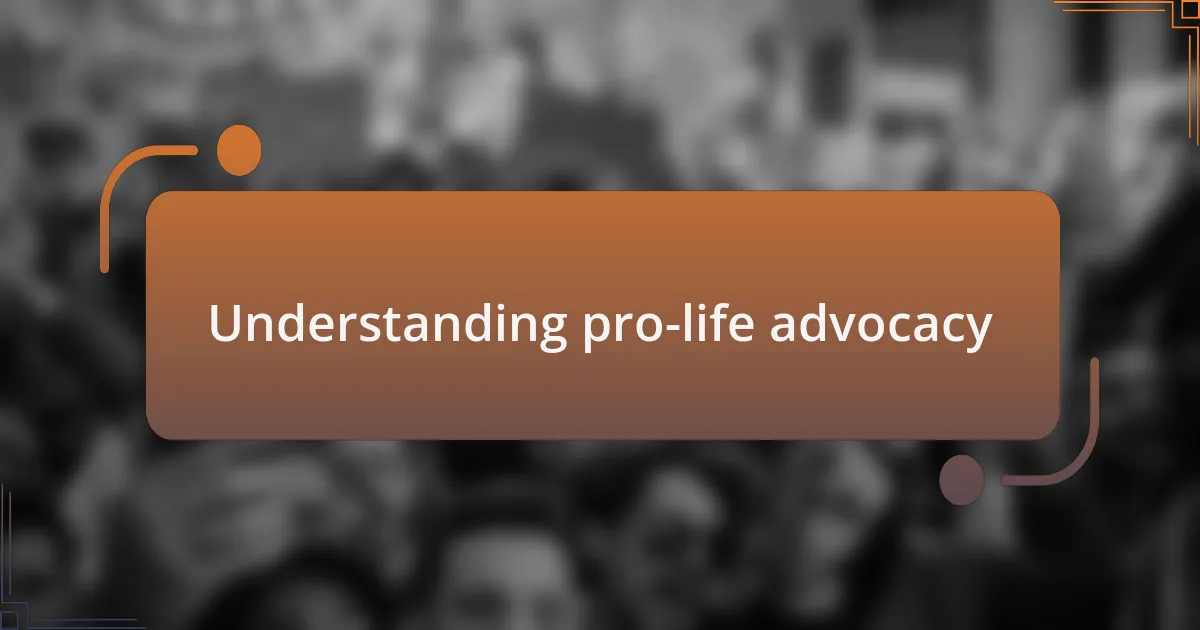
Understanding pro-life advocacy
Understanding pro-life advocacy involves more than just opposing abortion; it’s about championing the value of every human life from conception to natural death. I remember attending a pro-life rally where genuine stories touched my heart—stories of mothers who chose life against challenging circumstances. It was a vivid reminder that our advocacy is deeply rooted in compassion and the belief that everyone deserves a chance at life.
As I reflect on my journey in pro-life advocacy, I often find myself questioning the narratives we hear in society. It’s common to see pro-choice arguments framed around autonomy and freedom, but what happens to the voice of the unborn? I believe this question is crucial as it sheds light on the often-forgotten perspectives within the debate.
In my experience, understanding pro-life advocacy also means addressing the emotional turmoil that can arise from an unplanned pregnancy. I once spoke to a woman who felt immense pressure to terminate her pregnancy, yet her eventual choice to carry the baby to term brought her an unexpected joy. This taught me that pro-life advocacy is also about supporting women facing these dilemmas with love and resources.
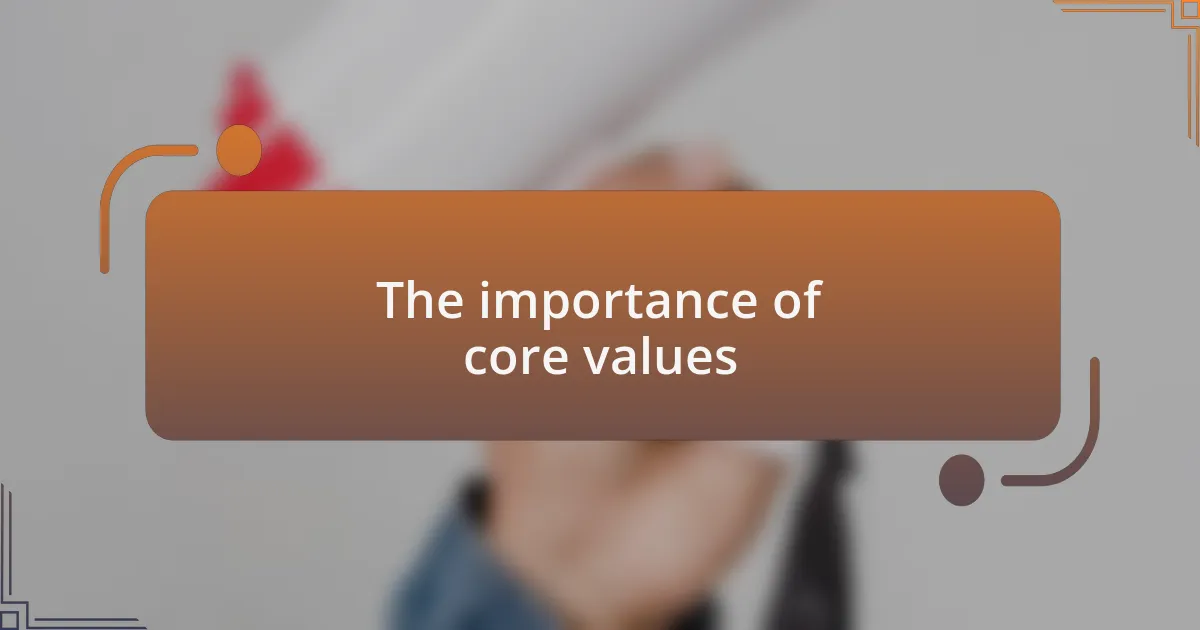
The importance of core values
Core values serve as the foundation of our beliefs and actions, guiding us through life’s challenges. I often think about the moment I first articulated my pro-life values in a heated discussion with a friend. Instead of simply defending my stance, I relied on the principles that drive me—compassion, respect for life, and understanding of human dignity—which helped turn a contentious debate into a meaningful exchange of ideas.
Embodying these core values not only strengthens personal conviction, but it also fosters connections with others who may not share the same perspective. During one advocacy event, I noticed that sharing stories centered on empathy rather than statistics led to transformative conversations. It became clear to me that when we emphasize our core values, we open a pathway for dialogue that can bridge divides and foster understanding.
Ultimately, our core values define how we respond to opposition. They anchor us during moments of doubt and reinforce our commitment to the cause. Reflecting on my experiences, I wonder: how can our shared values inspire more compassionate outreach? My belief is that by remaining true to our values, we empower ourselves to engage others, even those who vehemently disagree, in a way that is both respectful and impactful.
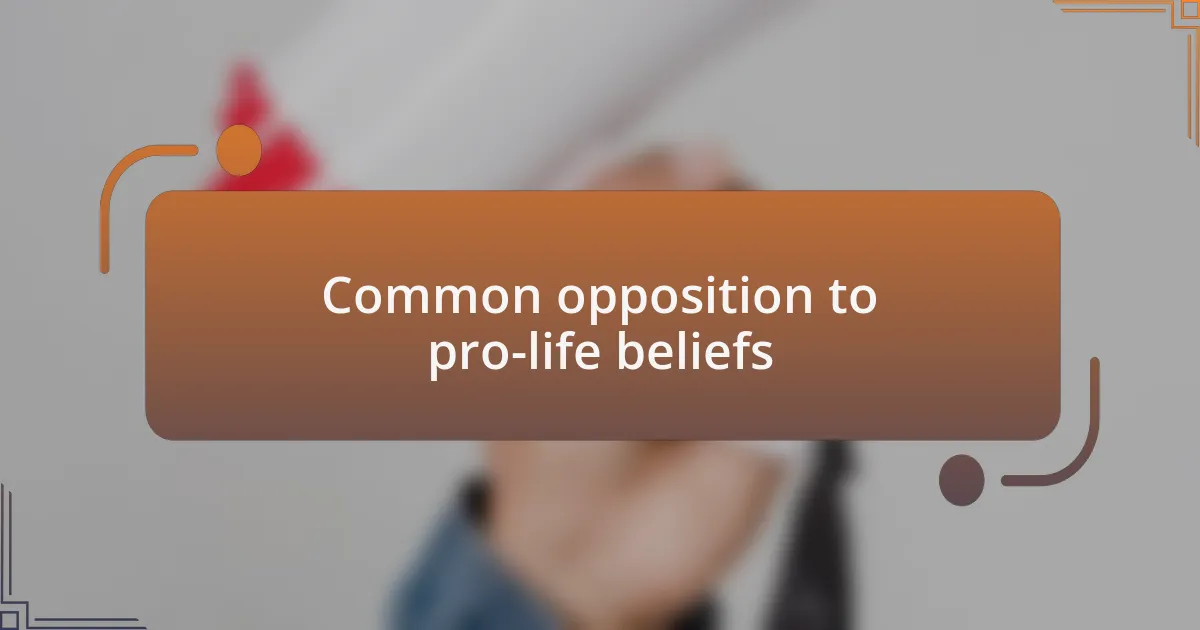
Common opposition to pro-life beliefs
One of the most common challenges I face when discussing pro-life beliefs is the misconception that we seek to control women’s choices. Often, I find myself in conversations where individuals express that pro-life advocates are anti-women. I recall an instance when I shared my perspective at a panel discussion and a participant asserted that my stance undermined women’s autonomy. It struck me then how our views can be so quickly polarized, leaving little room for nuanced conversation.
Another frequent point of opposition is the argument about bodily autonomy. People often counter with the notion that every individual should have the right to make decisions about their own body. I remember a heartfelt discussion with a close friend who feels strongly about this aspect of reproductive rights. I approached it by acknowledging her feelings, emphasizing that while I respect individual freedom, I also believe in the intrinsic value of the unborn. It’s a delicate balance that can ignite emotional debates.
Lastly, there’s the idea that pro-life simply doesn’t consider the circumstances surrounding pregnancies, such as poverty or health issues. I once encountered a passionate advocate who shared her own experiences with difficult pregnancies and how financial burdens influenced her choices. This encounter left me reflecting deeply on how important it is for us to address these realities without losing sight of our mission. Are we not also called to support mothers and families throughout this journey? This intersection of compassion and advocacy is where I believe we can find common ground amidst opposition.
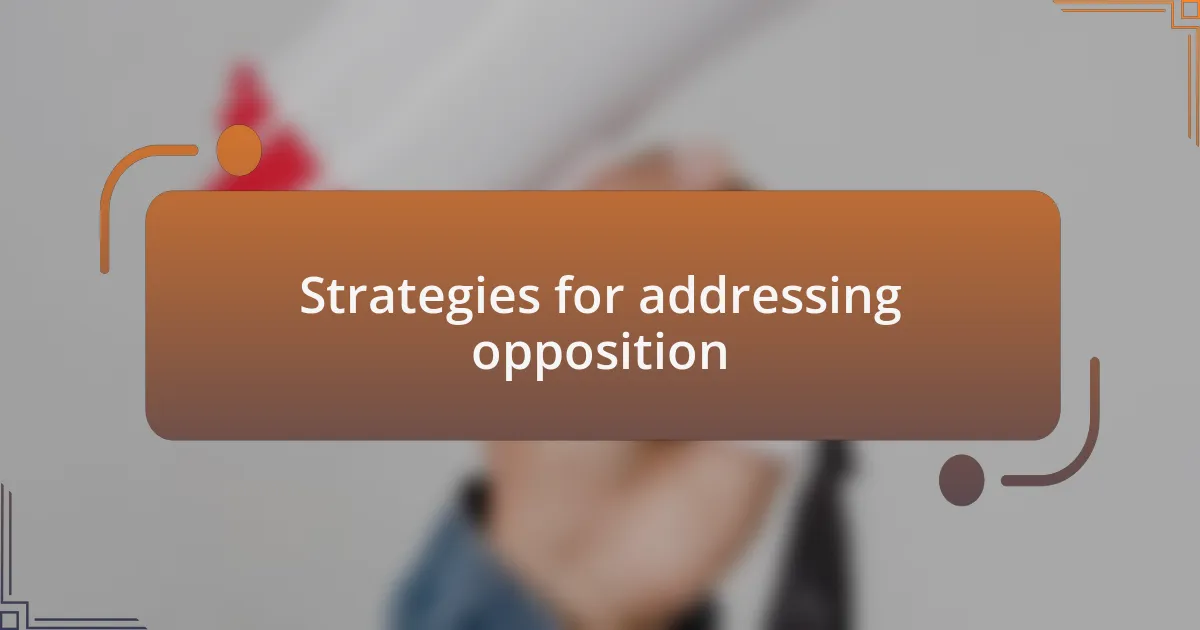
Strategies for addressing opposition
When I encounter opposition, I often start by fostering open dialogue. For instance, during a community event, I shared stories of women who chose life despite difficult circumstances. By presenting these personal testimonies, I aimed to humanize our cause and make it relatable. How can we expect others to understand our perspective if we don’t take the time to listen and share?
I also focus on finding common values. In conversations where I face significant pushback, I’ve found it helpful to highlight shared concerns, like the well-being of mothers and children. I once debated with a group that was firmly pro-choice, but we realized we all wanted to reduce unwanted pregnancies. This realization transformed our discussion, steering it toward solutions rather than division. Isn’t it fascinating how common goals can pave the way for mutual understanding?
Lastly, I employ emotional engagement as a powerful tool. I’ve told my own story about a close friend who, despite immense challenges, chose to keep her child. Her strength resonated, even with those who initially disagreed with me. I believe that by sharing these emotional journeys, we can touch hearts and encourage others to see beyond polarized opinions. After all, isn’t the ultimate goal to inspire empathy and understanding?
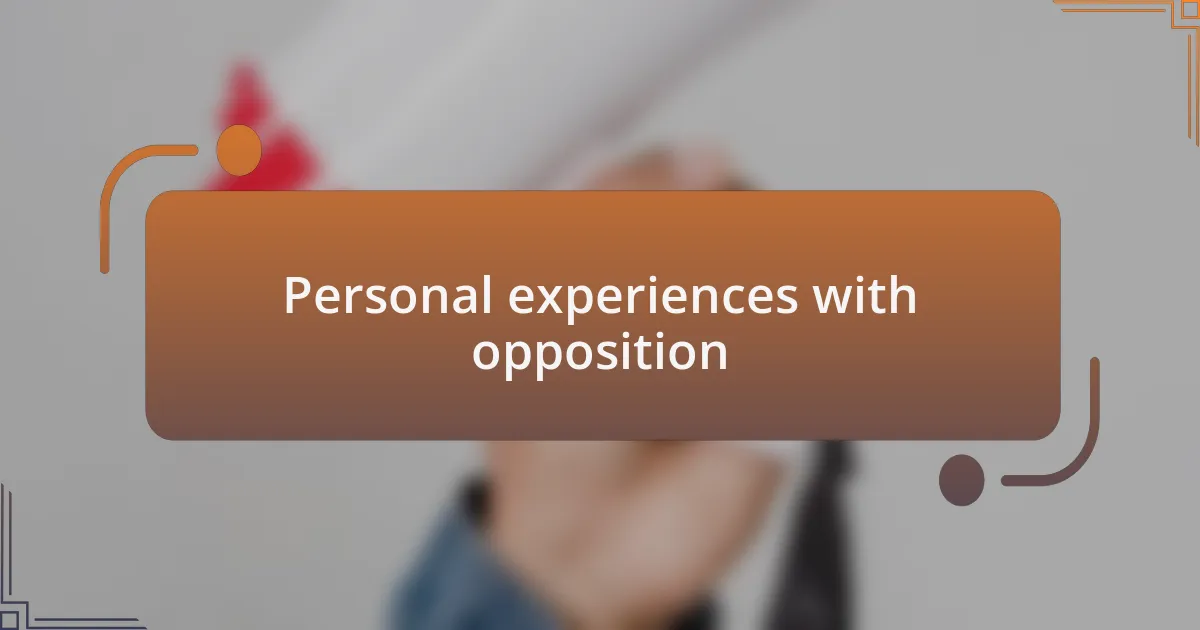
Personal experiences with opposition
When I reflect on my experiences with opposition, one moment stands out vividly. During a high school debate, I was pitted against a fiercely pro-choice advocate. As we exchanged views, I felt the heat of disagreement, but I decided to share a powerful story about my aunt, who faced pressure to terminate her pregnancy. By recounting her struggles and triumph in choosing life, I noticed a shift in the room—it was as if I had planted a seed of doubt in their rigid stance. Isn’t it interesting how personal stories can create bridges where facts alone often fail?
On another occasion, I faced a crowd that was vocally against my beliefs at a university panel. Their jeers and laughter were challenging, but instead of retreating, I sought to engage them. I asked, “How many of you have had a life-changing encounter that shifted your perspective?” Suddenly, the atmosphere changed. People started sharing their stories, and I realized that sometimes, prompting dialogue can turn opposition into understanding. It was a reminder that vulnerability can open doors even in the toughest conversations.
Then there was a particularly poignant moment in my local community, where tensions ran high during a pro-life rally. Some individuals expressed their dissent openly, and instead of distancing myself, I felt compelled to approach them. I shared the story of a young mother who was given a second chance and how it transformed her life. To my surprise, the exchange became a heartfelt discussion about hope and resilience. How remarkable it is that in sharing our truths, we can foster compassion, even in the face of conflict!
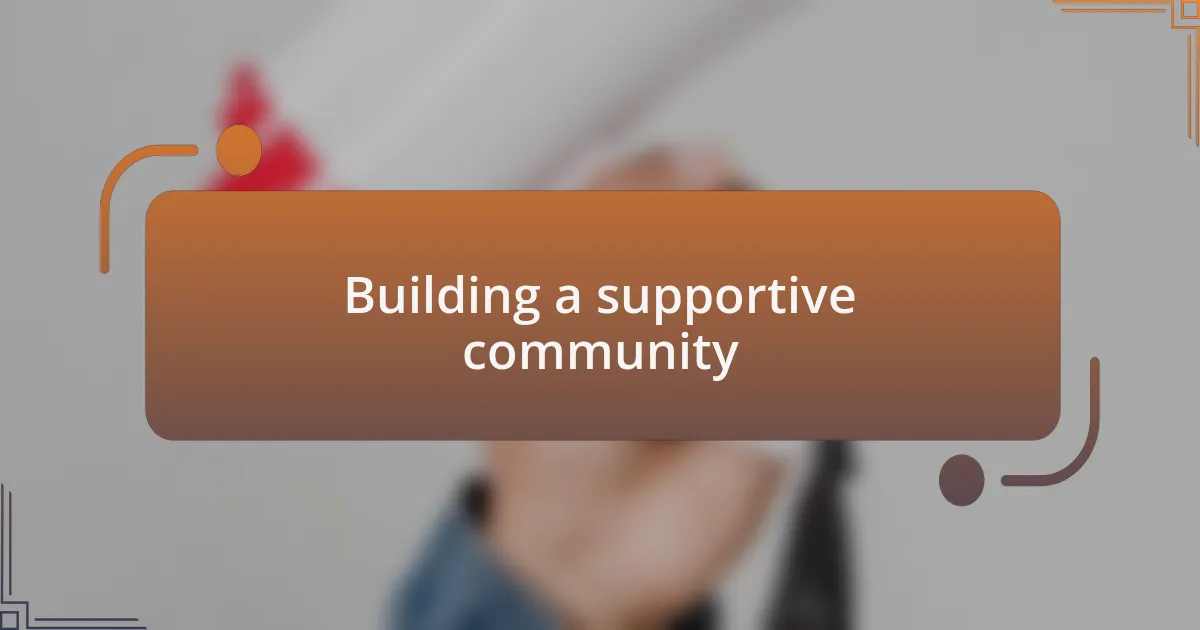
Building a supportive community
Building a supportive community is an essential facet of advocating for pro-life values. I’ve found that surrounding myself with individuals who share similar beliefs creates a solid foundation of encouragement and strength. Just last month, I volunteered at a local pro-life event, and it struck me how much energy and hope arose simply from being in the presence of like-minded advocates. Can you feel the difference when you’re among those who fundamentally resonate with your values?
In my experience, reaching out beyond our immediate circles can also foster a more extensive support network. I decided to connect with individuals from different backgrounds who, despite differing opinions, engaged in respectful dialogue about our beliefs. One enlightening conversation was with a colleague who initially identified as pro-choice. We spent an afternoon discussing our personal journeys and values, and I discovered that even our differences could lead to mutual respect and understanding. How powerful it is when we create spaces for open conversations!
Moreover, I believe that sharing resources and uplifting each other’s voices is crucial in building community. For instance, I often organize discussion groups where we can explore literature and testimonials that highlight the beauty of life. When one member bravely shared her own story of overcoming adversity during an unplanned pregnancy, I felt a surge of unity among us. Isn’t it inspiring to witness how our shared struggles can bind us together, ultimately strengthening our advocacy journey?